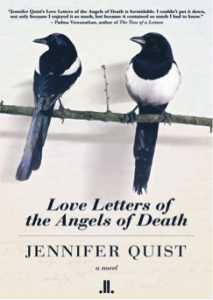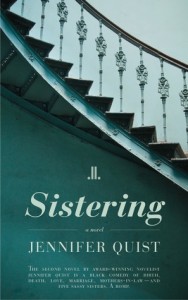An Interview with Jennifer Quist, Author of Sistering, Winner of the 2015 AML Novel Award
 Jennifer Quist is a journalist and novelist from Edmonton, Alberta. Her first novel, Love Letters from the Angel of Death (2013), was a finalist for the Whitney Award and the basis of her Lieutenant Governor of Alberta’s Emerging Artist Award in 2014. Her second novel, Sistering, won the 2015 Association for Mormon Letters Award for the Novel, was long-listed for the Alberta Readers’ Choice Award, and was named a “Must-Read” of the 2015 fall season by the Canadian Broadcasting Corporation. The interview was conducted by Michael Austin.
Jennifer Quist is a journalist and novelist from Edmonton, Alberta. Her first novel, Love Letters from the Angel of Death (2013), was a finalist for the Whitney Award and the basis of her Lieutenant Governor of Alberta’s Emerging Artist Award in 2014. Her second novel, Sistering, won the 2015 Association for Mormon Letters Award for the Novel, was long-listed for the Alberta Readers’ Choice Award, and was named a “Must-Read” of the 2015 fall season by the Canadian Broadcasting Corporation. The interview was conducted by Michael Austin.
Let’s start with the biographical details. Could you briefly describe your life so far? Start from the beginning and go up to the point that you decided to become a rich and famous writer.
I was born in a remote pulp-mill town in the northern boreal forest. My father was ambitious and restless and moved our family all over the immense country of Canada. By the time I graduated from high school, I had gone to eleven different schools. It would have been lonely if it weren’t for my close sibling group of seven, our ward families, and the grace of God that unfailingly sent me the few good friends I prayed for everywhere we went.
All of this, along with a temporary, treatable hearing loss that went undetected for too long, made my childhood an outsider’s upbringing—difficult but artistically instructive. When I was new in a school, during those long, awkward recesses alone, I would narrate the nothingness into some kind of story in my head—trying to make sense and meaning out of the untold stories of all the people I encountered in media res, out of all the quiet standing on the pavement by myself.
Maybe it sounds bleaker than it was. My siblings and I had the rich, imaginative, unstructured play of kids with no interest in sports. I didn’t notice until third grade that thinking about the world in terms of narratives wasn’t universal—or, at least, wasn’t universally done in the way that I did it. I had a teacher who told me I was talented at writing and I believed her. It was nice to be noteworthy in class for something other than just being new and I probably got hooked on the positive reinforcement like a rat feeding herself food pellets with a lever apparatus. Story-love, story-love, story-love. As in any good operant experiment, writing became its own reward and I reached a point where I would do it whether anyone was reading or not. Still, publication was always my goal.
I like the term that you used, “artistically instructive.” Could you elaborate on this a little bit? Do you think that some life experiences prepare one for writing more than others?
Storytelling is really story re-telling. For me that means the outsider who has never belonged—as opposed to an insider or a former insider—is often the best storyteller. They can be better at observation and expression not only because they don’t take the taken-for-granted for granted but also because they have to pay closer attention and work to be clearly understood in order to survive and be happy in alien landscapes.
Erich Auerbach makes some fascinating comments about the importance of a perspective of exile in dealing with literature and earning “a proper love for the world.” Please bear with me while I mention them without proper citations. Ha! He refers to a quote by Hugo of St. Victor which translates into “He who finds his homeland sweet is still a tender beginner; he to whom every soil is as his homeland is yet stronger; but he is perfect to whom the entire world is a place of exile.” It’s an overstatement of my own feelings but it does speak to my sense that my childhood in exile was an education in seeing, understanding, and learning how to frame and communicate strange worlds as stories.
So, when did you finally decide that you were ready to start submitting your work for publication—or, to use a phrase from Simone de Beauvoir that I have always loved, to “cast yourself into the world” and insist that it pay attention to your words and ideas?
 After graduating from university with a degree in sociology (at the time, a literature degree seemed too fanciful) I started a family with my very fine, very broke young husband. From home, I spent about fifteen years writing and publishing non-fiction and a little short fiction and poetry. When my fifth son was fresh out of babyhood, I got serious about novels. I submitted my first “quirky,” risky novel fifty times before finding a publisher on submission 51. It was awful but irresistible—almost like a kind of self-harm. I would stand in the shower crying, praying to be able to stop so the rejections would stop coming and the pain of it would end. And I always got out of the shower feeling calm, and like I could send the manuscript out one more time.
After graduating from university with a degree in sociology (at the time, a literature degree seemed too fanciful) I started a family with my very fine, very broke young husband. From home, I spent about fifteen years writing and publishing non-fiction and a little short fiction and poetry. When my fifth son was fresh out of babyhood, I got serious about novels. I submitted my first “quirky,” risky novel fifty times before finding a publisher on submission 51. It was awful but irresistible—almost like a kind of self-harm. I would stand in the shower crying, praying to be able to stop so the rejections would stop coming and the pain of it would end. And I always got out of the shower feeling calm, and like I could send the manuscript out one more time.
I believe in clumsy little human atonements, subordinate but part of an infinite one—that we’re driven to reach and hold onto each other. I write to overcome distance and isolation, to end separation—no more lonely children on the pavement. Overblown as it may sound, I write for love—the giving and the taking of it–and that means I write not only for myself.
I love that story, and I am so glad you stuck with it. I’m going to guess that one reason it took 51 tries is that your writing doesn’t fit comfortably into any of the standard genre categories, which is also why your books are so amazing. Both of them combine, in extremely interesting ways, light-hearted family comedy with elements of dark tragedy. Sistering has an especially dark plot twist that makes it impossible to forget. Could you briefly describe the corner of your psyche that comes up with these stories?
My father was raised in a house that had been converted from a funeral parlor. His parents were from the dark inland woods of New Brunswick, raised in gloomy Calvinist families with penchants for ghost stories. My spooky roots run deep. When I was thirteen, my father asked me to write down a family story—my grandmother’s story of a miraculous witness of faith she had at her baptism in the Saint John River—and from there I took especial note of all our legends. I’m a keeper of our family lore but, as I’ve remarked in interviews before, I’m a bad keeper who corrupts our history with my own fiction.
Also while we were kids living in the old eastern part of the country, we were often taken to cemeteries to look for graves to fill gaps in our genealogy. Even now I’m still very involved in family history work. As a sickly child (in addition to my brush with hearing loss I grew up with a kidney disease) my mortality was probably closer to the forefront than it might have been for other kids. I needed to shake hands with it at an early age. Family history work is an excellent way to do that, though it does darken the imagination when it comes to fiction. Fortunately, family history comes with lovely redemptive remedies for darkness bundled within it.
One of the other remarkable things about Sistering is that each of the five sisters narrates a portion of the story in her own, unique voice—sometimes even contradicting, or at least reframing, the descriptions of the other narrators. This gives it a richness of perspective that most books lack. Did the book start out to have these multiple perspectives, or did you come to it during the writing process?
 The first draft was written with a narration in the first person by Suzanne alone. The intent was that what she didn’t know about her sisters’ lives she would confabulate, the way I think we tend to do with people we know very well. My publisher—the same one that hadn’t balked when I wrote my first novel in the second person—said it was asking a bit too much of readers. If I couldn’t convince her, I likely couldn’t convince anyone so I went back and completely reworked the story including sharing the point of view among five narrators and the single, collective voice that narrates the last chapter. To tune the voices, I read each sister’s chapters as uninterrupted stories from beginning to end. The split narrative was more challenging than my first version but I’m satisfied with how it’s turned out.
The first draft was written with a narration in the first person by Suzanne alone. The intent was that what she didn’t know about her sisters’ lives she would confabulate, the way I think we tend to do with people we know very well. My publisher—the same one that hadn’t balked when I wrote my first novel in the second person—said it was asking a bit too much of readers. If I couldn’t convince her, I likely couldn’t convince anyone so I went back and completely reworked the story including sharing the point of view among five narrators and the single, collective voice that narrates the last chapter. To tune the voices, I read each sister’s chapters as uninterrupted stories from beginning to end. The split narrative was more challenging than my first version but I’m satisfied with how it’s turned out.
I suspect that AML readers will be interested in the way that your Mormon background influenced your stories. Neither your characters nor your plots are overtly Mormon (I picked up a few signal markers in Love Letters, but couldn’t even see traces in Sistering), and yet a lot of people, me included, have no problem considering your work “Mormon Literature.” Could you briefly explain how you see your own religious background as influencing your fiction?
The use of “Mormon” is difficult for me. I am from a family of fairly recent converts, most of whom have apostatized. There was a small window of time when my entire extended family was a Mormon family but it ended in my early twenties. My husband’s family is Martin Handcart Company blue-blooded but also heavily beset by apostasy. We don’t live in a Mormon town but in one of Canada’s larger, cosmopolitan cities. Except for two very misfit years of high school, I haven’t spent much time in Mormon towns. I went inside the walls of a Church school for the first time this March when I went to the AML conference [at BYU-Hawaii]. “Mormon,” as I think it may be used by many writer-ly LDS people, is not my culture. I have remained in the Church as most of the people I love have fallen away for reasons that are personal rather than based on family, social, or cultural connections. My Mormonism persists in spite of my family, social, and cultural connections.
It is my background as a faith, a discipline, as my entire heart and soul, but not as my culture. As a religious background it influences my choice of words, allusions, sense of family, approach to death, birth, the body. It influences everything like, oh, let’s presume to borrow the metaphor of leaven. It’s inextricable from the whole loaf that is a complete book. Spiritual inspiration is part of the writing process. Sometimes its influence is very clear. There’s a line in my first novel that readers have repeated back to me more than any other as particularly meaningful. It’s a line I first spoke while teaching a Relief Society lesson, looking for spiritual enlightenment. When writing is good, it’s the same thing.
As you point out, there are fewer of what Jack Harrell might call “tags” in my work. I’ve been reading Harrell’s new book and I appreciate the way he describes these tags as superficial shortcuts, cultural props that stand in place of delving into what truly matters about an LDS worldview. While I agree with Harrell, none of this was on my mind as I wrote my first two novels. I didn’t work under the burden of self-consciousness of which I’ve heard other Mormon writers speak. I never asked myself if I was writing for the mass market or the Mormon niche. I was lucky and free to just write.
Having said all that, I do think there are tags in my work, they’re just out of the usual context and harder to identify. For instance, Sistering includes a scene where a woman dresses another woman’s body for burial. Only a funeral professional or a Relief Society sister could move through the mechanics of a scene like that with any authenticity. And I am no funeral professional.
Of course, I have been called out in mainstream Mormon-y outlets for not being Mormon enough. It’s not just a Utah problem. Even after being a Whitney finalist and an AML Award winner, I can’t convince LDS bookstores in my area, way up here in Canada, to carry my work. I don’t like these attitudes but they do put me at liberty to comment on the Mormon book scene from a position of having nothing to lose.
When I was up for a Whitney Award for my first book, someone mused on Twitter about how he should vote. He wondered if he should vote for the best book by a Mormon in 2013 or for the best Mormon book of 2013. I replied, riffing on the Orson F. Whitney quote that’s supposed to be the mission statement of the Whitney project, that my favourite books of Milton and Shakespeare’s are definitely their Mormon books. There’s got to be middle ground in Mormon lit between Rexburg and outer space, and in those spaces, we need to trust the stories to voices other than those of heartland missionary fish-out-of-water characters. This middle ground is where millions of LDS people live. It’s the future of the Church and, I would wager, of Mormon literature. There’s room for all of us and resistance and protectionism from the Mormon cultural heartland only holds everyone back. I suppose what I’m saying, in what may be an obnoxious, nothing-to-lose kind of way, is I don’t really know how to help readers find the Mormon forest in my or anyone else’s work if they can’t see for the missing conventional Church-tag trees.
Wonderful! I think that “between Rexburg and outer space” might be the best prepositional phrase ever uttered. I hope you make it the title of an essay or a blog post—perhaps even here in the AML blog—discussing the future of Mormon literature (about which I think you are absolutely correct). One last question, which, I suppose, is obligatory in interviews like these, but I really want to know: what’s your next book going to be about, and are you working on anything else presently? And does this have anything to do with your recent trip to China?
Thanks for asking. The Canada Council for the Arts awarded me a grant this year to finish the first draft of my third novel. It’s another realistic, contemporary family story set in Edmonton where I live. There are Mormons in it as important but not main characters. And there is a little China in it too. Well, it started out with a little China in it. Never approach China intending to come away with only a little bit of anything.

Very nice. I particularly like the line: “I believe in clumsy little human atonements, subordinate but part of an infinite one.”
It’s my sense that Mormons, if we write about what is important to us, our work will wind up being intrinsically Mormon, even if it’s not in ways others might recognize — and even if our work has no Mormon characters in it. Even in outer space — or Rexburg, which for some of us is more alien still…
I really like this: “There’s got to be middle ground in Mormon lit between Rexburg and outer space, and in those spaces, we need to trust the stories to voices other than those of heartland missionary fish-out-of-water characters.”